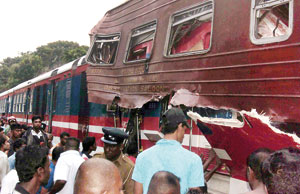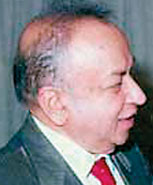Mahinda Chinthanaya – 2005 states, “Steps will be taken to increase pensions on par with increases of government servants’salaries. Anomalies affecting all categories of pensioners will be removed to safeguard their dignity.”
The dignity of the pre-2006 pensioners has been steadily eroding over the past six years with the ever-increasing cost of living. About 90 percent of these pensioners suffer from all kinds of ailments. As a result, they have to contend with skyrocketing prices of drugs and medical treatment while trying to keep their body and soul together.
Considering the high cost of living that prevailed in 2006, the government increased the salaries of public servants. But the plight of pensioners and the anomalies in their payments were completely disregarded. Since then the pensioners have been making representations to the government. It was in recognition of this situation that President Mahinda Rajapaksa included the above statement in his Chinthanaya. It was subsequently included in the ‘Mahinda Chinthanaya - Ediri Dekma’ too. The implementation of these intentions was delayed owing to the war and other constraints.
Meanwhile, the Director of Pensions, by his proposals headed ‘Budget Proposal – 2009 – Proposals regarding pensions’ recommended the rectification of this grave anomaly in three instalments in 2009, 2010 and 2011.
These proposals, with the concurrence of all pension associations, were forwarded to the Finance Ministry. Had these proposals been implemented then the anomaly would have been resolved by now.
As we are all aware, a large number of pensioners affected by this anomaly have since died without receiving their due benefits. It is not too late to implement these proposals at least from 2012 in order that the rest of the pensioners still remaining alive may receive their due benefits.
N.P.K.Kumarasinghe.
Vice President,
Association of Retired Cartographic Draughtsmen, Survey Department.
Gampaha.
Train brakes failed in Alawwa accident ?
A committee is to ascertain whether the driver in the Alawwa train accident was at fault. From reports, it is evident that the fault was in the train’s brake system. It should be noted that it was a slow train that was approaching the station. Even if the signals were faulty and showed green, the driver would have slowed down the train to stop at the station. In fact, the train collided with the other train at speed.
 |
| The tragic accident that claimed three lives |
That the smashed bodies of the driver and his assistant were found at the rear of the engine shows the two abandoned the driving cab to escape the collision.
If the brakes had been working properly, they would have applied them instead of panicking and abandoning the cabin. This proves they realised they could not control the train and tried to save themselves. Sadly, they could not.
Railway workers have been agitating over these engines from the day of the inaugural journey, when the train stalled halfway. The authorities did not heed the warnings. More faulty engines were brought down, not for the benefit of the travelling public.
The signal system is also dated and should be replaced.
We remember the purchase of engines from France, overriding a tender board decision. Nine out of 10 engines are said to be unusable.
Sarath Karunaratne,
Via e mail
Change of train services problem for passengers
Those who use the train between Kalutara South and Bambalapitiya are inconvenienced by the change of train services between Aluthgama and Galle Station.
The train that leaves Maradana at 5.50 pm for Aluthgama has been replaced by a power set with four compartments. The earlier train had some 12 compartments pulled by a diesel hydraulic engine. Passengers at the Bambalapitiya Station are unable to get in as the train is packed. Why not change this for a power set with eight compartments?
Again, the morning train that leaves Kalutara South at 7.22 a.m. has only four compartments. The train is packed when it arrives at the Wadduwa Station. The answer is an eight-compartment power set.
Train Traveller,
Wadduwa
Memorable moments with the late Dr. Hameed
I refer to Mr. A. C. A. Gafoor’s appreciation (Sunday Times, September 4, 2011) on the occasion of the late Dr. A. C. S. Hameed’s 11th death anniversary. I would like to add two memorable stories regarding the late Dr. Hameed, when he was Foreign Minister, as told to us by Mr. Thalif Deen.
 |
| A.C.S. Hameed |
During the UN Sessions in New York in 1978, an Eelam activist from London smuggled himself into the UN building, and tried to upstage Dr. Hameed by walking on to the General Assembly podium and letting off a diatribe against the Government.
When the President of the Assembly realised he had an intruder on his hands, he switched off the microphone. Within minutes, security guards had bodily ejected the intruder from the hall.As Dr. Hameed walked up to the podium, there was pin-drop silence.
Without missing a beat, Dr. Hameed had the last word: “I want to thank the former speaker for keeping his speech short,” he said, as the Assembly burst into laughter.
The late Dr. Hameed was a rare politician who enjoyed political cartoons about himself. He must be the only Sri Lankan politician to publish, at his own expense, an entire collection of cartoons lampooning him.
In his appreciation, Mr. Gafoor said there were only eight UNP members elected to Parliament. In fact, eight UNP members were elected only during the 1956 general elections. In 1970, 17 UNP members were elected. Later this number increased to 21 through by-elections held in Puttalam, Kesbewa, Mannar and Kalawewa.
C. M. de Silva,
Ratmalana
Paying respect in different ways
Publicity has been given to a high scorer in the 5th Standard scholarship examination in Mullaitivu who failed to pay obeisance to a Minister in the traditional manner. We do not for a moment think he meant any disrespect. In these parts, “falling at the feet” of someone is done only during worship at a temple. This is how one pays respect to the Almighty (sashdanga namaskaram).
Not falling at the feet of someone does not mean a lack of respect for parents, elders, teachers, relatives or leaders. Respect is shown in different ways, largely through body language. If the event organisers had wanted such a show of obeisance, they should have prepared the boy for it. However, such practices are best avoided. The lad is obviously a good student. Let not minor things distract him or others from the main goal, and that is to get a good education and do well at the exams.
The practice of falling at the feet of people to get blessings is prevalent in India, especially South India, and the south of Sri Lanka.
R. Suntharalingam,
Via e mail
|
